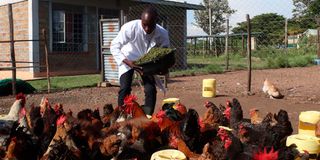Graduate’s chicken business now a model farm in Kendu Bay

Victor Ouma feeds chicken at the farm in Kendu Bay town.
What you need to know:
- Apart from the improved kienyeji chickens, the farm in Old Kendu Bay town also has ornamental birds like silkie, bantam chickens, guinea fowls and geese.
- The monthly turnover for Chak Achaka Farm varies, with the peak season being December when many families buy chickens for the festivities.
Universities and colleges churn out thousands of graduates, who end up competing for limited job opportunities.
For few, employment is usually a step away. A majority will, however, have to contend with joblessness, sometimes for years. Others in this category never wait for office jobs.
That was the case of Victor Odhiambo Ouma, who now runs a poultry farm in Kendu Bay.
Ouma mainly keeps improved kienyeji chickens for meat and eggs. The farm in Old Kendu Bay town also has ornamental birds like silkie, bantam chickens, guinea fowls and geese.
Chak Achaka (just start) Farm has a 5,500-egg capacity hatchery.
After graduating from Lake Institute of Tropical Medicine in 2017, Ouma began hunting for a job, hoping to be a community health officer.
Unsuccessful, his passion for agriculture was rekindled. He recalled seeing his father sell chickens to get his school fees.
“I had two projects in mind, growing watermelons and keeping chickens,” Ouma says.
He started by doing menial jobs for capital and ended up raising Sh150,000.
Ouma then bought 500 chicks for Sh100 each. He also bought Sh60,000 feed. Part of the remaining amount was used on feeders and other equipment.
“I used at least Sh10,000 on vaccines and other chemicals,” the farmer says.
He eyed a farm once run by another chicken entrepreneur.
“Chak Achaka Farm is on government property. The structures were put up by the state to support entrepreneurs like me. I registered with the authorities dealing with small and medium size enterprise to get the permit to operate,” he says.
Most of the birds he had bought earlier survived to maturity. He sold each for Sh750 months later.
Six months after starting the business, Ouma generated profit that was almost double the capital. With that, he thought of expanding the enterprise.
“Some birds died before maturity but that did not bother me much. Those are some of the hazards of business,” he says.
Part of his expansion plan was to have a hatchery. That meant he had to acquire incubators and get training in poultry production.
A year after the first sale, Ouma bought as Sh95,000 incubator that could hold 1,056 eggs. He enrolled for an online course in poultry management.
“Demand for meat and live birds from Chak Achaka grew. I had to think of sustaining the market. Hatching chicks appeared viable,” Ouma says.
Curiosity and farm visits drove him into the ornamental birds business.
Apart from the geese, the birds are kept in enclosures.
Chak Achaka Farm now has four incubators. It hatches at least 1,500 chicks every week, most of which are sold to poultry farmers.
When the Seeds of Gold team visited, Ouma had placed 4,000 eggs in three incubators. Eggs from the fourth incubator had just been hatched.
Two hundred chickens were feeding at an enclosed area while 40 geese were moving around.
Many people no longer find poultry farming attractive. Those still practising it have had to be innovative in order to remain in business.
Like other farmers, Ouma says the cost of feed has been going up.
Two hundred chickens consume 25 kilogrammes of feed a day, while chicks need 15 kilos.
His secret is feed formulation. Ouma’s birds eat feed made from soya, sunflower, maize and other ingredients.
He says some processed feeds sold by agrovets may not have all the nutritional value as stated in their packaging.
“I have leased several pieces of land for the crops. The maize, soya and others are harvested, formulated and given to the birds,” Ouma says.
The four acres of sunflower and soya can feed 1,000 chickens for four months.
The birds also feed on azolla (mosquito ferns) and aquatic plants, which he sources from Kiambu County.
The farm has several ponds for growing the plants.
Ouma adds chicken droppings into the water, helping to multiply the number of the plants in the ponds.
The plant is scooped with a sieve and grows to its original height in 14 days.
“It is important not to harvest everything. Some must be left in the ponds to multiply,” Ouma says, adding that he also applies hydroponic technology to cut on production costs.
Hydroponics involves growing plants in a water-based nutrient solution instead of soil.
According to Zachary Odero, an agronomist with the Homa Bay County government, feed formulation greatly reduces the cost of production. He advises farmers to ensure the ratio is correct.
“Soya is good in protein. If given in large quantities, it may lead to fast growth of the birds. Unfortunately, the quality of eggs from such birds is poor,” he says.
The monthly turnover for Chak Achaka Farm varies, with the peak season being December when many families buy chickens for the festivities.
The cash he makes partly goes towards farm operations like settling electricity bills and paying his four workers.
The farm consumes about Sh6,000 worth of power a month. The electricity mainly powers the incubators.
Frequent blackouts mean he must have a stand-by generator.





